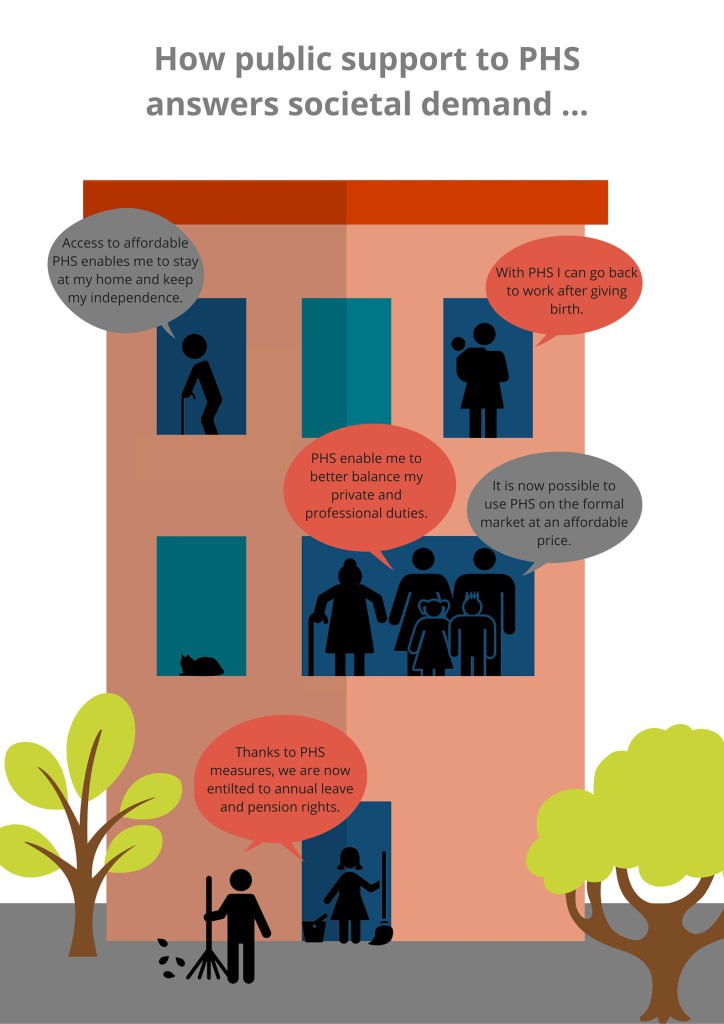PHS should therefore be a political priority from an economic and societal point of view
Given all the contextual elements listed above, the PHS background may seem highly unfavourable. However, opportunities exist to create a positive environment for the successful deployment of PHS. As discussed, demand is higher than the formal and affordable supply. The provision of personal and household services has many positive collective externalities for society as a whole, such as the reduction of undeclared work and unemployment, the strengthening of social cohesion (for both users and workers), the progress towards the reconciliation of people’s professional and private lives and help with reintegrating into the labour market. For that reason, “in order to internalize such collective benefits, it makes sense for the state to subsidize substantially the consumption of such service” (Defourny, 2010). As such, the main positive externalities of public support are:
- Fighting the undeclared economy: the Commission states that “taking into account the importance of undeclared work in the PHS sectors, public authorities can consider intervening with the aim of encouraging the provision of PHS in the formal economy”. They should support measures to move these services from the shadow to the formal economy, generate additional tax revenues for the State through job creation and savings in public expenditure (e.g. reduction in unemployment benefits, more tax collection). What is more, it is a way to create job opportunities for the relatively low-skilled, particularly as far as housework.
- Creating jobs (especially for women): in recent years, PHS has been the second-fastest growing employment sector in the EU after ICT. In April 2012, the Commission estimated the job creation potential of the PHS sector to be 5.5 million jobs. Developing PHS could thus contribute to achieving the “Europe 2020” employment objectives. Several experiments in EU Member States to support the sector have proved to be efficient. In this regard, 450 000 jobs have been created in France since 2005. In Belgium, the Titres-services voucher system created 149 800 new jobs between 2004 and 2012. PHS create non-relocatable jobs for long-term unemployed and low-skilled people as well as for migrant workers. They also contribute to women’s participation to the labour market and to social inclusion by directly providing them with a job (on average, 90 % of PHS workers are women).
- Improving working conditions and attractiveness: formalising PHS is also a way to implement a status through collective agreements, with the same rights and entitlements as other workers under general labour law, including social security nets and rights to unemployment benefits, pensions, maternity leave, legal holidays, and so on. Formalisation is the basis for social recognition of the value of these services and of the workers providing them. Consequently, it is a way to motivate workers, retain them and make the sector more attractive, which in turn has a positive impact on the quality of the services provided.
- Improving professionalisation: personal and household service jobs require a number of technical and interpersonal skills which are currently undervalued in our societies. It is generally stated that PHS jobs mostly concern women and that those jobs do not require any training. Professionalisation in the sector could consist of targeted initial training and continuing training of employees. Continuing training is of particular importance because it helps to fight against workers’ isolation, especially as many of them are working in private homes. Finally, professionalisation encourages the structuring of the sector, ensures that greater value is attached to the work and that workers are recognised, and at the same time the benefit of purchasing these services on the formal market becomes more obvious for users.
- Improving the quality of care: because the sector’s workforce has the right skills, benefits from good working conditions and is subject to quality controls on the service providers run by the managing public authority.
- Attracting/Retaining women in the labour market: with a solid PHS sector, women are less tempted to stop working (or work part-time) while they are responsible for one or more dependant relatives. The possibility of outsourcing personal and household activities becomes a solution those who do not want to take on this responsibility alone, if the services become affordable, especially by introducing public measures that support the sectors. A study revealed that in Sweden for every hour of household services purchased, married women (aged 25-55) gained 1.8 hours, of which 60% is used for paid work (Halldén, 2014). Therefore purchasing PHS increased women’s participation in the labour market.
- Increasing wellbeing through a better work-life balance: better work-life balance can be achieved by increasing externalisation of daily tasks at home and of care for children and the elderly. Accessible and affordable care services are also an important precondition for increasing female participation in the labour market.
- Developing equity between men and women: by directly providing women a job and by giving them access to services that enable them to combine more easily their private and professional lives; PHS favour women’s inclusion in the labour market. They also offer solutions for better allocation between men and women of care and housework tasks.
- Increasing companies’ growth and productivity: by improving employee motivation through better work-life balance, companies can reduce absenteeism and presenteeism. What is more, developing the formal provision of PHS favours the creation of new companies. In this regard, public intervention in Belgium, France and Sweden has had a positive effect on the creation and/or growth of 1 065, 8 300 and 13 500 SMEs respectively.
- Strengthening social inclusion and fighting poverty: especially for migrants, women and the low-skilled working population, who make up the majority of PHS workers. However, support for PHS measures also contributes to the social inclusion of society’s most dependent people. That is particularly true for children, as early childhood education and care is recognised as an efficient tool to break the disadvantage cycle, particularly poverty.
- Favouring population growth: given that PHS lower stress and constraints related to childcare, better access to those services might influence couples’ family planning decisions.







